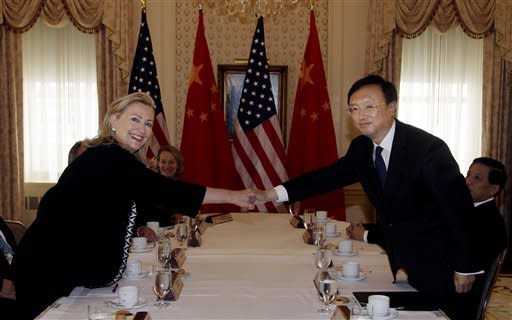 The Envoy
The EnvoyThe Clinton doctrine on economic statecraft: Clinton to urge U.S. diplomats to put economics at top of foreign policy agenda

As a practical matter, the complex work of managing American relations with China--the leading creditor of the United States--falls only in part to America's top diplomat, Secretary of State Hillary Clinton. Witness Senate Democrats' vow to take up legislation this week that could sanction China for allegedly undervaluing the yuan--at the cost, according to Sen. Chuck Schumer (D-N.Y.), of American jobs. But if Clinton has her way, she'd have more of a say.
If the fight against terrorism dominated American foreign policy in the decade after 9/11, the decade ahead could well be defined by efforts to manage the U.S. role in the global economy.
And in many ways, Hillary Clinton's diplomatic portfolio is increasingly dominated by global economic challenges. Trade issues obviously have a direct impact on America's efforts to emerge from the present economic downturn--from the battles over the national debt to the need to stimulate job growth. But economic issues also shape other less-noted features of the American foreign-policy agenda, be it the effort to contain fallout from Europe's debt crisis, to managing the rise of G20 economic powers such as Brazil, Turkey and India—all of whom come bearing their own foreign policy ambitions. As a result, diplomats say, economic and foreign policy are growing ever more intertwined.
"The trading floor is increasingly replacing the battlefield as the forum for state contacts," according to one of Clinton's State Department advisers, who spoke on condition of anonymity so as to describe the department's economic plans more broadly.
So Hillary Clinton has been working hard to beef up the economic bench strength of the State Department, while also mounting a bid for State officials to play a more decisive role in determining U.S. global economics policy. Aides expect her to lay out what they are calling the "Clinton doctrine on economic statecraft" early this month, likely in a speech in New York. Timing and venue for the address are still being worked out, her aides say.
"This is coming from a sense that we are seeing the lines between national security and economic security blur as emerging powers are doing more to advance their economic power, and fitting their national security strategy more around economic interest," the State Department adviser told The Envoy Friday.
A key precept in this effort is addressing a kind of cultural lag in the antiquated world of bureaucratic Washington. Lead policy makers may recognize the pivotal role that economics plays in global diplomacy--but in many ways, the diplomatic bureaucracy needs to catch up. Clinton's planned speech is in large part a call to her own agency's ambassadors, diplomatic staff and analysts to shift their thinking.
And as Secretary Clinton lays out that vision in more detail, she will stress two main bulwarks, aides say. First, she will highlight the need to advance relations with the wider world as part of the effort to revive the American domestic economic order. And second, she will stress that State Department diplomats and foreign policy thinkers need to work harder to understand how market forces are driving first-order national security challenges in hot spots such as Afghanistan, Iraq and Iran.
Clinton's strong interest in global economics issues is hardly a secret. She has denied persistent rumors that she has her eye on the World Bank chief job when Robert Zoellick's tenure ends next fall.
But such Beltway speculation aside, it's hard not to notice the many ways that Clinton has started to sound like a World Bank or Treasury official as she holds down her present job at the State Department. And she's managing the department with a clear eye toward bulking up its economics portfolio.
Clinton has made several recent hires in her corps of advisers, with backgrounds in economics and finance. She has launched a new energy security bureau--headed by special envoy/coordinator Carlos Pascual, the former U.S. ambassador to Mexico, aided by new deputy assistant secretary Amos Hochstein. She's brought on a deputy secretary of state for management and budgets from Wall Street (Morgan Stanley's Tom Nides). And she has been pushing for the State Department to work prominently in framing American economic policy objectives more broadly. That means, in part, elbowing State's way into inter-agency discussions on U.S. international economic policy-making. Treasury Secretary Timothy Geithner, U.S. Trade Representative Ron Kirk and Clinton are at the heart of this scrum; Clinton's aide won't handicap her chance of winning--these are diplomats, remember?--but the aide stressed that she's taking the long view.
In her in-house think tank, State Department policy planning chief Jake Sullivan, and senior adviser Jennifer Harris, a lawyer and economist who worked on the intelligence community's Global Trends 2025 report (pdf), have been among the key thinkers helping Clinton flesh out her approach to economic statecraft. Sullivan and Harris arranged a "deep dive" on the issue for Clinton back in February.
Clinton explained the logic behind the new economic initiatives recently in Hong Kong.
"As we pursue recovery and growth, we are making economics a priority of our foreign policy," Clinton said at the International Institute for Strategic Studies-Shangri La conference in Hong Kong in July. "Because increasingly, economic progress depends on strong diplomatic ties and diplomatic progress depends on strong economic ties. And so the United States is working to harness all aspects of our relationships with other countries to support our mutual growth."
"All of us here today recognize that a strong economy at home is vital to America's leadership in the world," Clinton similarly told the U.S. Global Leadership Coalition conference in July, before sounding a retrospective note about her tenure at State. "After spending two and a half years as your Secretary of State, traveling nearly 600,000 miles, I have reached one overarching conclusion: Simply put, we need to up our game."


